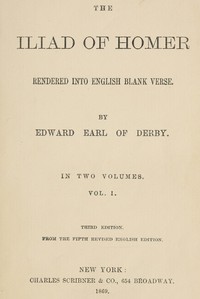The Iliad
Author: Homer
Bookshelves: History - Ancient, Literature, Poetry, Classical Antiquity

Summary
"The Iliad" by Homer is an epic poem written in ancient times, likely around the 8th century BC. This foundational work of Western literature revolves around the events of the Trojan War, focusing primarily on the conflict between the Greek warrior Achilles and Agamemnon, the leader of the Greek forces. The narrative delves deeply into themes of honor, wrath, and the consequences of pride, evoking a vivid picture of ancient heroic ideals. At the start of "The Iliad," the conflict is ignited by Agamemnon's refusal to return Chryseis, a captive woman, to her father, inciting the wrath of Apollo, who sends a plague upon the Greeks. As the story unfolds, Achilles, who is insulted when Agamemnon seizes his own prize, Briseis, withdraws from battle, threatening the Greek side's success. The opening portion sets the stage for intense character interactions, propelling the plot toward themes of vengeance, divine intervention, and the exploration of personal grievances against the backdrop of war. The introduction of key figures, including the wise Nestor and the fierce Hector, foreshadows the complexities of human emotions intertwined with the vast scale of the conflict. (This is an automatically generated summary.)
 LibraryManager
LibraryManager